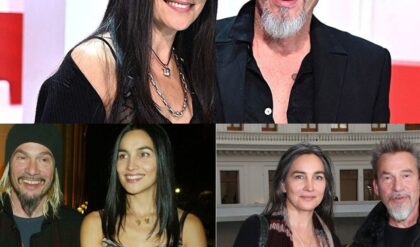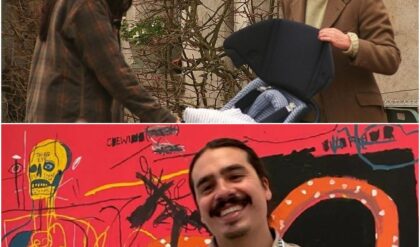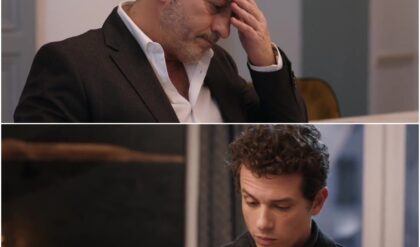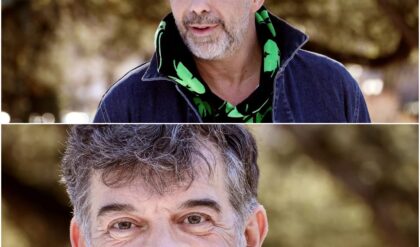The actor on how much she cares for South Africa, giving back to the country, and investing in the health and safety of the next generation.

“It’s not that I’m biased because I’m from there,” Charlize Theron says of South Africa. Although for more than two decades the Oscar winner has been one of Hollywood’s most successful actresses and producers, her heart remains in her home country. “It is one of those places that’s truly, truly special,” she says. “You can ask anybody who has ever been. I’ve never not heard somebody talk that way about the country.”
Yet, growing up there in the 1980s, amid the onset of the AIDS epidemic—which still grips the country today—was also traumatic for her. “I was around 10 years old, and people around me were dying and scared,” she recalls. “We now know that it was HIV and AIDS, but not a lot of people had that information then. It left an impression on me from a young age that has always been hard to shake.”
After Theron moved to the US in the 1990s, her acting career skyrocketed following breakout roles in 2 Days in the Valley and The Devil’s Advocate. Yet, she says, “I wanted to still be a part of my country in a proactive way, and so I was looking at how I could be of service.”

In 2007, she founded the Charlize Theron Africa Outreach Programme. Among the organization’s earliest initiatives was the dispatching of mobile health clinics in South Africa, in partnership with Oprah’s Angel Network, that offered HIV prevention programmes to young people. These mobile units were a start, but Theron says she quickly realised that they were “a drop in the bucket.” Many factors were driving the AIDS pandemic; she and her colleagues would need to expand CTAOP’s mission to include wider education and health initiatives.
The prospect of expansion was daunting. “It’s a pretty high mountain to stare at, and the shadow is pretty dark,” Theron says. “But if you’re not brave enough to go in there with people who can guide you and really be the ones with the solution, change just doesn’t happen.”
Sixteen years later, CTAOP has helped support 33 community-based organisations in southern African countries including Rwanda, Zambia, Zimbabwe, and the Democratic Republic of Congo. Although it has only four full-time staffers, the organization punches above its weight; it has expanded its focus to include initiatives addressing health, education, vaccine equity, and gender-based violence.
CTAOP’s programme partners include the KZN Network on Violence Against Women, which trains rapid response teams in South Africa’s KwaZulu-Natal province; HIVSA, an organization dedicated to “creating an HIV-free generation”; and the Biomedical Research and Training Institute, which provides training and support services to public health researchers.
“Part of what we’re trying to do is prove a model,” says Ashlee George, CTAOP’s executive director. “We would love to be able to show how our impact is different from traditional philanthropy (as we turn) over more power to our partners.”
While most of their organisation’s funding comes from American sources—including Theron herself—the critical work of community outreach is largely carried out by members of the on-the-ground organisations, which often gives them access and an effectiveness that larger outside philanthropic organisations may lack. “There are a lot of old systems and thought processes for how things should be that are very hard to move the needle on,” Theron says. “It’s something that we believe you have to be incredibly respectful of. Our partners on the ground are trying to move outside the box within the community in a way that’s not off-putting, but where you can slowly turn around hearts and minds.”
The work can be perilous for some of CTAOP’s partners. Lucinda Evans, a human rights defender and director of Cape Town’s Philisa Abafazi Bethu Women’s Center, which provides services for women and families (including safe houses for victims of gender-based and anti-LGBT violence), has been targeted by direct gang threats and had to get a bulletproof vest.
“I work with young people who sometimes come through bullets to come to our center,” Evans said at a recent CTAOP fundraising event. The organisation’s financial support, she said, has enabled her to expand her outreach to women and youths she could not previously reach. Many members of CTAOP’s various grassroots partners face comparable threats. “Fighting against stigma creates friction within communities, because there are those who want to stick with things how they are,” George says. “A lot of the partners are working in very dangerous environments.”

Theron’s CTAOP team and their partners are grappling with frustratingly tenacious situations and issues. Eastern and southern Africa remain the regions most heavily affected by HIV, according to the United Nations, which estimates that 7.5 million people in South Africa are living with HIV—more than 10 percent of the population.
Violence in the country remains rampant. More than 100 rapes are reported every day, yet only one in nine victims reports the crime, and only 2 percent of accused rapists are convicted. During the 2020 Covid lockdowns, Theron’s programme partners reported back that gender-based violence was drastically escalating. “People were being asked to stay at home with their abusers,” Theron says. “There was a femicide happening in South Africa, and nobody was really talking about it.” The CTAOP team mobilised, co-launching the #TogetherForHer initiative to combat pandemic-era violence in Africa and globally. The organisation—and Theron personally—quickly committed half a million dollars to the effort, and helped galvanize such Hollywood A-listers as Margot Robbie, Viola Davis, and Salma Hayek Pinault to support the initiative.
“She is so passionately dedicated to CTAOP,” says Robbie, Theron’s co-star in the 2019 film Bombshell. “It’s so clear how much she cares for South Africa, for giving back to the country and for investing in the health and safety of the next generation.”When she was 15, Theron herself was a victim of gender-based violence. At her family’s farm in Benoni, her father drunkenly threatened her and her mother with a gun. In self-defense Theron’s mother shot and killed him in front of their daughter. Theron demurs when asked if this traumatic event spurred her commitment to combating violence against women. “I would say this: It’s a simple correlation to make,” she says.
“But I think it’s way more complicated than having just one night of trauma in your life. With or without that, gender-based violence is so in your face in South Africa and globally. It’s hard to not be aware of these things just purely by being a woman.”
The greater formative trauma, she adds, “was growing up in a country under apartheid and having AIDS come. Those things really, really marked me—I almost want to say more than just that one night in my life.” Theron has also been raising awareness about gender-based violence, among other issues, as a United Nations Messenger of Peace since 2008. Selected by the UN secretary general, the 13 current Messengers of Peace are such distinguished global citizens as Jane Goodall, Yo-Yo Ma, and Malala Yousafzai. “Charlize has been an enormous champion for us,” says Andi Gitow, head of Advocacy, Entertainment Industry Engagement, and Civil Society at the UN. Theron’s commitment to combating violence against women and fighting HIV and AIDS distinguishes her. “She was a very articulate and passionate voice for these issues early on,” Gitow adds. Her global profile is an essential asset. “There are so many people affected by these things whom our other ambassadors and heads of government cannot reach,” Gitow says. “Someone with her profile will be able to reach them.”
The future poses many challenges to philanthropic organisations of all sizes, from rampant misinformation to climate change. Yet, Theron and George say they’re determined to remain agile in response to the needs of their partners. In the meantime they continue to fight to direct the world’s attention to their region of focus and compete for meaningful funding relationships. “Anybody can think they can throw a fundraiser,” Theron says.
But getting the right people in the room who are willing to make long-term investments in the organisation and its partners is another thing altogether. “That’s what we at CTAOP are really invested in, and it takes years to home in on.” Among her supporters: Dior, for which Theron is the face of J’Adore Parfum d’Eau; and Breitling SA, the Swiss luxury watchmaker, for which Theron is a longstanding spokesperson. Georges Kern, CEO of Breitling, says, “Breitling has been honored to support the vital work she does and will continue to use our partnership to spotlight her commendable and ongoing philanthropic work.”
Despite the impact CTAOP has made and the respect she commands for her activism, however, Theron maintains that she is uncomfortable being the face of the organization that she created a decade and a half ago. “I need to get the Charlize Theron part out of our organisation’s name,” she says. “Because, honestly, we have an incredible team, here and on the ground. They’re doing a part of the job that I could never do, right? This truly is something that we’ve all built together.





